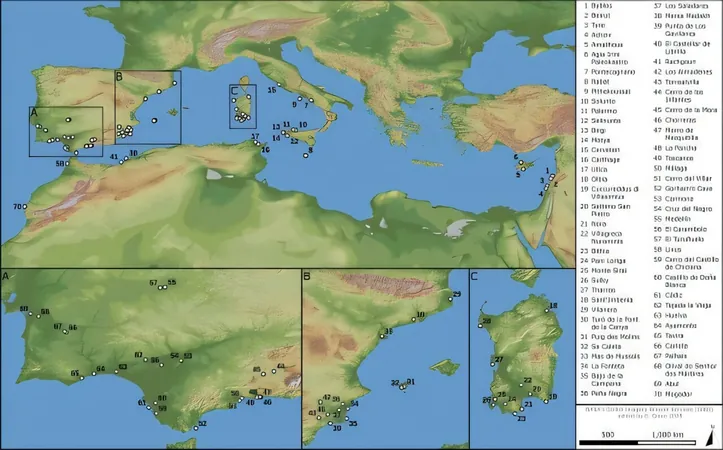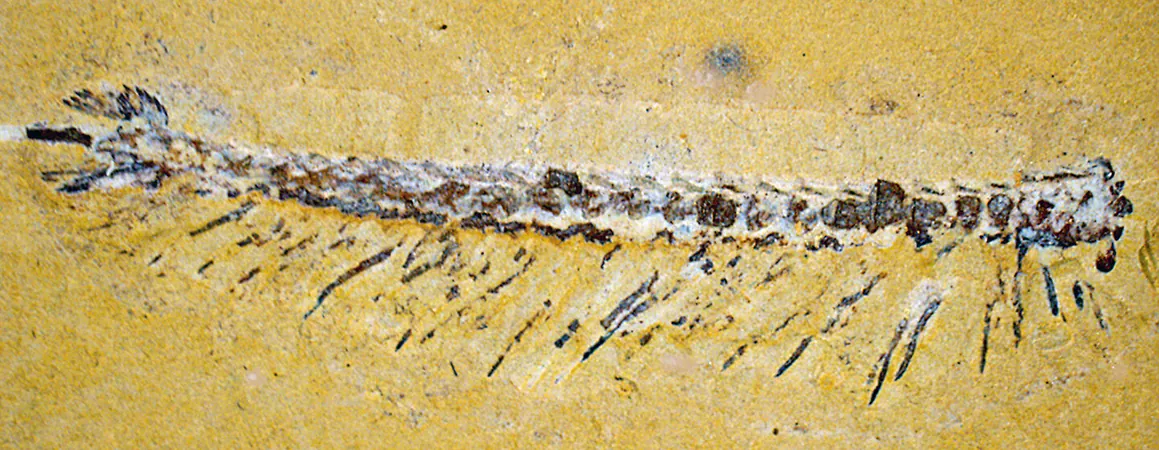
Unlocking the Mysteries of Ancient Scents: How Phoenician Oil Bottles from Motya Transform Our Understanding of the Iron Age Mediterranean
2025-08-25
Author: Jacob
While pottery and bones can withstand the test of time, the enchanting aromas of ancient cultures often vanish without a trace. However, groundbreaking research is changing that narrative! An interdisciplinary team of experts has meticulously dissected 51 ceramic oil vessels unearthed from the Phoenician settlement of Motya, an island off Sicily's coast.
This pioneering study brings to light the vital role that the power of scent played in shaping identity, memory, and cultural exchanges throughout the Mediterranean during the Iron Age. Spearheaded by scholars from the University of Tübingen and the Complutense University of Madrid, their findings have been published in the Journal of Archaeological Method and Theory.
Decoding the Vessels: Origins and Contents
The examined vessels—simple yet elegant ceramic bottles ranging from 15.5 to 18.5 cm tall—date back to the 8th to 6th centuries BCE. Often found in tombs, homes, and sacred sites, their widespread presence across the Mediterranean hints at a variety of significant uses.
The research team utilized advanced methods to trace the origins of these vessels, discovering a production hub in southern Phoenicia, particularly near modern-day Beirut and the Carmel region. A deeper dive into the organic residues trapped within eight of the 51 vessels revealed traces of plant-based lipids along with pine and mastic resin, suggesting that these vessels were designed to carry fragrant oils.
The Scent of Identity and Connectivity
Dr. Amicone noted, "Our findings confirm that these ceramic vessels were not mere containers; they were conduits for transporting aromatic oils that served as cultural connectors. Carrying the scents of their homeland, they fostered a sense of belonging and invigorated shared memories among Phoenician communities across the Mediterranean."
This period was characterized by dynamic movements of people, trade, and cultural interactions, with the Phoenicians at the helm as legendary sailors and traders. Their intimate connection to aromatic substances was crucial for both local use and export.
Rethinking Ancient Connectivity
The study challenges us to reconsider how migration, trade, and cultural identity were navigated in ancient times. Dr. Orsingher proposes, "We need to shift our perspective on ancient mobility, recognizing it not solely as a movement of goods but as an exchange of scents, memories, and sensory customs." He emphasizes that scent is deeply intertwined with identity, playing a significant yet often overlooked role in migration, settlement, and cultural interchanges.
As Amicone highlighted, "Our research illuminates the value of interdisciplinary science in revealing the elusive aspects of antiquity." Through this exploration of what these vessels contained and how they were utilized, we gain new insights into how scents united lives and cultures in the ancient Mediterranean.
A New Frontier in Archaeological Research
University of Tübingen President, Prof. Dr. Dr. h.c. (Dōshisha) Karla Pollmann, states, "Innovative research approaches continue to uncover surprising insights into the past. This study exemplifies how even the faintest traces, such as ancient scents, can be revealed through interdisciplinary methods, providing a new lens into the sensory and cultural realms of antiquity."









 Brasil (PT)
Brasil (PT)
 Canada (EN)
Canada (EN)
 Chile (ES)
Chile (ES)
 Česko (CS)
Česko (CS)
 대한민국 (KO)
대한민국 (KO)
 España (ES)
España (ES)
 France (FR)
France (FR)
 Hong Kong (EN)
Hong Kong (EN)
 Italia (IT)
Italia (IT)
 日本 (JA)
日本 (JA)
 Magyarország (HU)
Magyarország (HU)
 Norge (NO)
Norge (NO)
 Polska (PL)
Polska (PL)
 Schweiz (DE)
Schweiz (DE)
 Singapore (EN)
Singapore (EN)
 Sverige (SV)
Sverige (SV)
 Suomi (FI)
Suomi (FI)
 Türkiye (TR)
Türkiye (TR)
 الإمارات العربية المتحدة (AR)
الإمارات العربية المتحدة (AR)